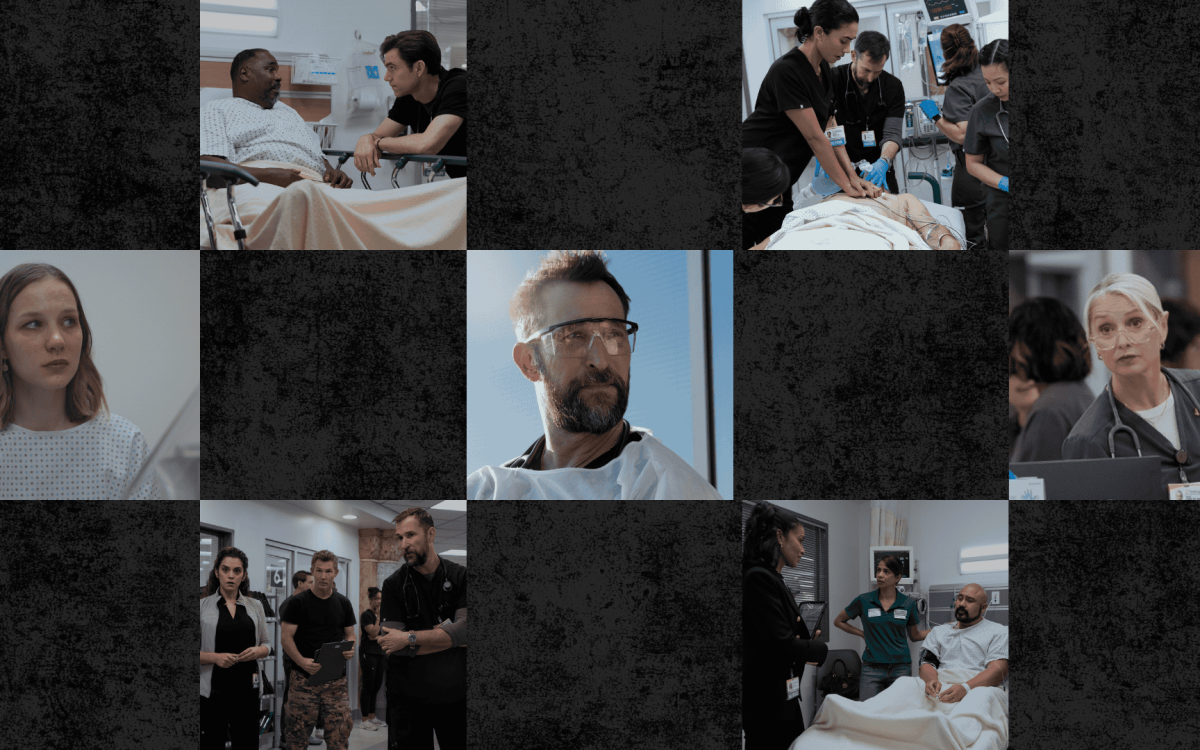Health
-

How realistic is ‘The Pitt’?
Doctors weigh in on what hit TV show gets right and wrong about life in the ER — from pacing and caseloads to workplace culture (and that waiting room from hell)
-

Yoga can help cut severe, initial opioid-withdrawal period in half, study finds
Researchers say results could dramatically increase chances of recovery
-

6 keys to a long, healthy life (ice cream included)
Also, why reading Ben Franklin beats climbing Mount Everest
-

Six cancers rising faster in younger adults than older ones
Large new global study fuels growing concern over trend of increases in several types

-

What’s next for GLP-1s?
Scientists eye new treatment targets for popular weight-loss drugs, from heart failure to addiction
-

Drinking 2-3 cups of coffee a day tied to lower dementia risk
Caffeinated tea also found to slow cognitive decline in study

-
Dramatic increase in ER waiting time for seriously ill patients
Patients of all racial, ethnic, and socioeconomic status are facing ever-increasing waits for care in emergency rooms, according to a study published online today by the journal Health Affairs. The…
-
M. Judah Folkman, biomedical pioneer, dies at 74
One of Harvard Medical School’s (HMS) most forward-looking and innovative physician-scientists, M. Judah Folkman, died suddenly Monday (Jan. 14) after suffering a heart attack at the Denver International Airport in…
-
Peter Black named President-Elect of World Federation of Neurosurgical Societies
Peter Black, MD, PhD, Franc D. Ingraham Professor of Neurosurgery at Harvard Medical School and founding chair of the Brigham and Women’s Hospital Department of Neurosurgery has been elected President-Elect…
-
Chromosomal abnormality linked to autism disorders
Researchers have fitted another piece into the complex genetic puzzle that is autism, finding DNA deletions and duplications on a specific chromosome that they say explains one to two percent…
-
Those least needy most likely to get free drug samples
Most free drug samples are not used to ease the burden of the poor or the uninsured, but rather go to those most able to pay for their prescriptions, according…
-
Gene variation may elevate risk of liver tumor in patients with cirrhosis
A genetic variation appears to significantly increase the risk that individuals with cirrhosis of the liver will develop hepatocellular carcinoma (HCC), a liver tumor that is the third leading cause…
-
Harvard researchers achieve stem cell milestone
Harvard Stem Cell Institute researchers have successfully turned back the clock on human skin cells, causing them to revert to an embryonic stem cell-like state from which they can become…
-
Microchip-based device can detect rare tumor cells in bloodstream
A team of investigators from the Massachusetts General Hospital (MGH) BioMicroElectroMechanical Systems (BioMEMS) Resource Center and the MGH Cancer Center has developed a microchip-based device that can isolate, enumerate and…
-
Researchers discover second light-sensing system in human eye
New research on blind subjects has bolstered evidence that the human eye has two separate light-sensing systems — one that perceives the familiar visual signals that allow us to see…
-
New survey of public attitudes on cold and cough medications for children
A new survey from NPR, the Kaiser Family Foundation, and the Harvard School of Public Health examines the public’s views of over-the-counter children’s cold and cough medications in the wake…
-
Transitivity, the orbitofrontal cortex, and neuroeconomics
You study the menu at a restaurant and decide to order the steak rather than the salmon. But when the waiter tells you about the lobster special, you decide lobster…
-
Bonsai collection highlights age, beauty
The foliage is green and youthful, but the twisted, gnarled trunks show the trees’ age. But that’s the point, of course.
-
Newly discovered type of cell death may end up inhibiting tumor growth
Sometimes healthy cells commit suicide. In the 1970s, scientists showed that a type of programmed cell death called apoptosis plays a key role in development, and the 2002 Nobel Prize in physiology or medicine recognized their work. As apoptotic cells degrade, they display standard characteristics, including irregular bulges in the membrane and nuclear fragmentation.
-
Slow reading in dyslexia is tied to disorganized brain tracts
Dyslexia marked by poor reading fluency — slow and choppy reading — may be caused by disorganized, meandering tracts of nerve fibers in the brain, according to researchers at Children’s Hospital Boston and Beth Israel Deaconess Medical Center (BIDMC). Their study, using the latest imaging methods, gives researchers a glimpse of what may go wrong in the structure of some dyslexic readers’ brains that makes it difficult to integrate the information needed for rapid, “automatic” reading.
-
Blood stem cell’s roles could help clarify pathogenesis
No other stem cell is more thoroughly understood than the blood, or hematopoietic, stem cell. These occasional and rare cells, scattered sparingly throughout the marrow and capable of replenishing an entire blood system, have been the driving force behind successful bone marrow transplants for decades. Scientists, for the most part, have seen this as the hematopoietic stem cell’s (HSC) singular role: to remain in the bone marrow indefinitely and to replenish blood and immune system cells only when called upon.
-
Brain systems less coordinated with age
Some brain systems become less coordinated with age even in the absence of Alzheimer’s disease, according to a new study from Harvard University. The results help to explain why advanced age is often accompanied by a loss of mental agility, even in an otherwise healthy individual.
-
Increasing growth hormone release reduces abdominal fat
Treatment with an investigational drug that induces the release of growth hormone significantly improved the symptoms of HIV lipodystrophy, a condition involving redistribution of fat and other metabolic changes in patients receiving combination drug therapy for HIV infection.
-
Even in healthy elderly, brain systems become less coordinated
Some brain systems become less coordinated with age even in the absence of Alzheimer’s disease, according to a new study from Harvard University. The results help to explain why advanced…
-
Slow reading in dyslexia tied to disorganized brain tracts
Dyslexia marked by poor reading fluency — slow and choppy reading — may be caused by disorganized, meandering tracts of nerve fibers in the brain, according to researchers at Children’s…
-
Feminist pioneers discuss women’s health policy
More than three decades after publication of the taboo-shattering book on female health, “Our Bodies, Ourselves,” activists are still struggling to bring attention to women’s health issues amid the national debate over medical insurance coverage, said one of the book’s authors and feminist pioneer Judy Norsigian.
-
Scientists identify gene responsible for statin-induced muscle pain
Statins, the popular class of drugs used to lower cholesterol, are among the most commonly prescribed medications in developed countries. But for some patients, accompanying side effects of muscle weakness and pain become chronic problems and, in rare cases, can escalate to debilitating and even life-threatening damage.
-
Telling the arthropod tale of life
They had sifted through the forest floor’s leaves and dirt for days, looking for a tiny type of daddy longlegs native to New Zealand, but had little more than dirty hands to show for it.
-
Selective attention most impaired during first night shift worked
Our biological propensity for keeping awake during the day and sleeping at night makes night work a challenge. Now, researchers at Brigham and Women’s Hospital (BWH) have found that attention is especially affected during the first night shift. This research appears in the Nov. 28 issue of the Public Library of Science One.
-
Blood stem cells fight invaders
No other stem cell is more thoroughly understood than the blood, or hematopoietic, stem cell. These occasional and rare cells, scattered sparingly throughout the marrow and capable of replenishing an…
-
Differences between malaria parasites in patients’ blood and in lab
In a groundbreaking study published today in the advance online edition of Nature, an international research team has for the first time measured which of the the malaria parasite’s genes are turned on or off during actual infection in humans, rather than in cell cultures, unearthing surprising behaviors and opening a window on the most critical aspects of parasite biology.
-
Gene responsible for statin-induced muscle pain identified
Statins, the popular class of drugs used to lower cholesterol, are among the most commonly prescribed medications in developed countries. But for some patients, accompanying side effects of muscle weakness…
-
Shift workers most impaired on first night shift following day shifts
Researchers at Harvard Medical School affiliate Brigham and Women’s Hospital (BWH) have found that the attention of shift workers is most impaired on the first night shift following a string…
-
Prostate cancer treatments often not matched to patient needs
More than a third of men with early prostate cancer who participated in a study analyzing treatment choice received therapies that might not be appropriate, based on pre-existing problems with…
-
Responding to Congo’s epidemic of violence against women
The rape itself was brutal enough, but the woman’s nearly severed hand shocked Susan Bartels. It was early November and her first day working at Panzi Hospital in Bukavu, a…
-
Researchers in Japan and Wisconsin report major advance in stem cell research
“The field is moving at lightning speed,” said Harvard Stem Cell Institute (HSCI) Co-Director Doug Melton in response to just-published papers by Japanese researchers and researchers at the University…


